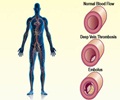US scientists have identified a possible protein link to a deadly thrombosis condition called antiphospholipid syndrome (APS).
US scientists have identified a possible protein link to a deadly thrombosis condition called antiphospholipid syndrome (APS). The discovery could obviate the need for lifelong anti-coagulant therapy.
“Patients with APS have circulating antibodies that cause exaggerated thrombosis. The longstanding mystery has been how these antibodies initiate the clotting,” said Dr. Philip Shaul, professor of pediatrics at the UT Southwestern Medical Center and senior co-author of the study.For the study, the researchers first examined the direct actions of APS antibodies on cultured endothelial cells, which line the inside of blood vessels.
They discovered that the thrombosis-inducing antibodies recognize a protein called Beta2-Glycoprotein I on the endothelial cell surface that then interacts with a second protein, apolipoprotein E receptor 2 (apoER2). ApoER2 ultimately inactivates the enzyme that produces the antithrombotic molecule nitric oxide. The decrease in nitric oxide causes both white blood cells and platelets to bind to the endothelium, initiating the thrombosis.
Dr. Shaul said the findings are quite promising because they identify the series of molecular events responsible for the exaggerated thrombosis.
The study also found that in contrast to normal mice, mice genetically engineered to lack apoER2 are completely protected from developing thrombosis when they are given APS antibodies collected from individuals with the syndrome.
“Patients with thrombosis often require lifelong anti-coagulation therapy,” he said. “The problem with this approach is that the anti-coagulation can be ineffective, and there are multiple potential serious complications related to bleeding. It makes much more sense to develop new therapies that target the underlying disease mechanism.”
Advertisement
“Even if a woman with APS does carry to term, the infant is often smaller than normal and can suffer from multiple complications,” Dr. Mineo said. “Our ongoing studies indicate that the mechanisms we have identified that provoke thrombosis are also operative in APS during pregnancy to adversely affect the health of both the mother and the fetus.”
Advertisement
“If they prevent thrombosis or pregnancy complications in the mouse models, clinical trials would of course follow,” Dr. Shaul said.
The findings are available online and in a future issue of The Journal of Clinical Investigation.
The study was supported by the National Institutes of Health, the Alliance for Lupus Research, The Lowe Foundation, the Crystal Charity Ball Center for Pediatric Critical Care Research, and the Robert L. Moore Endowment from Children’s Medical Center Foundation.
Source-Medindia









